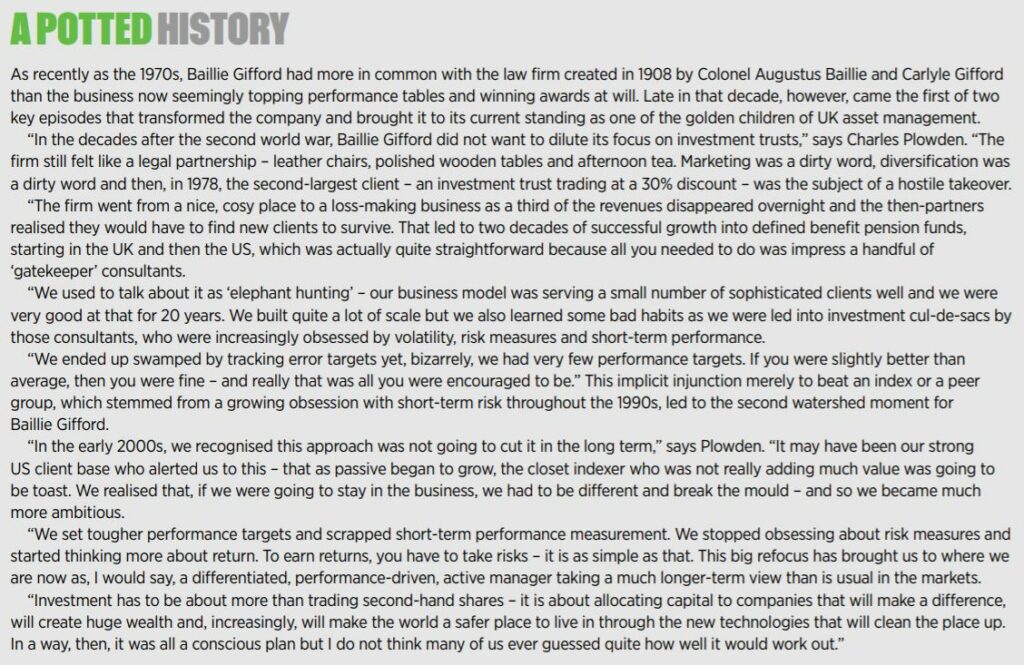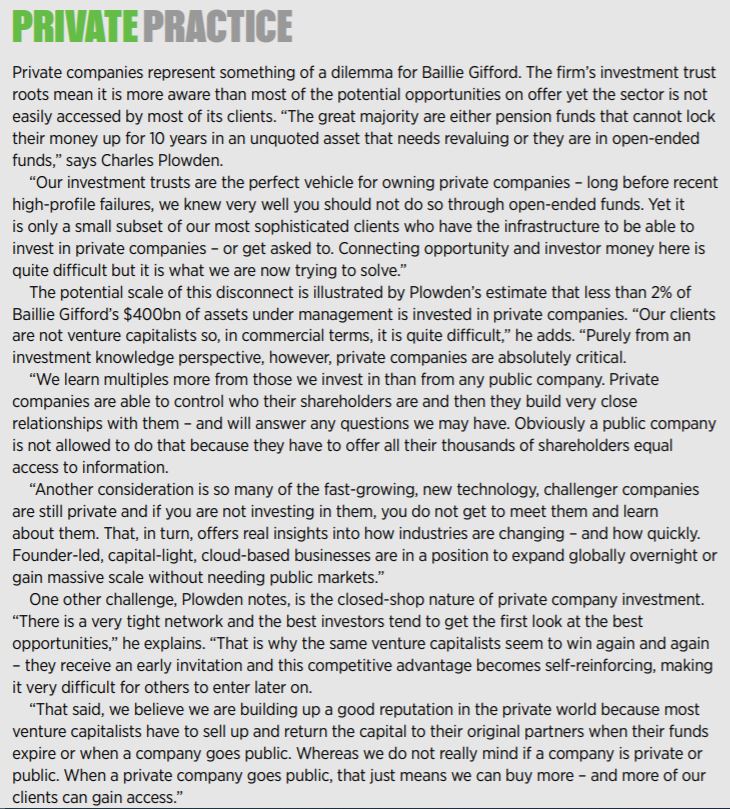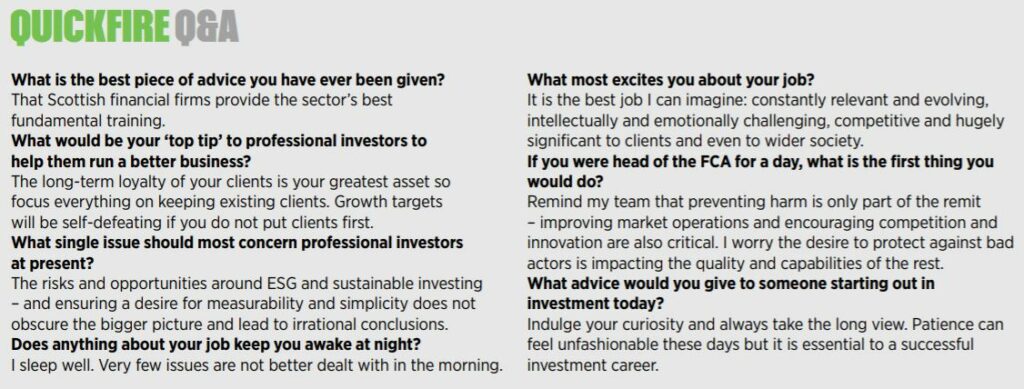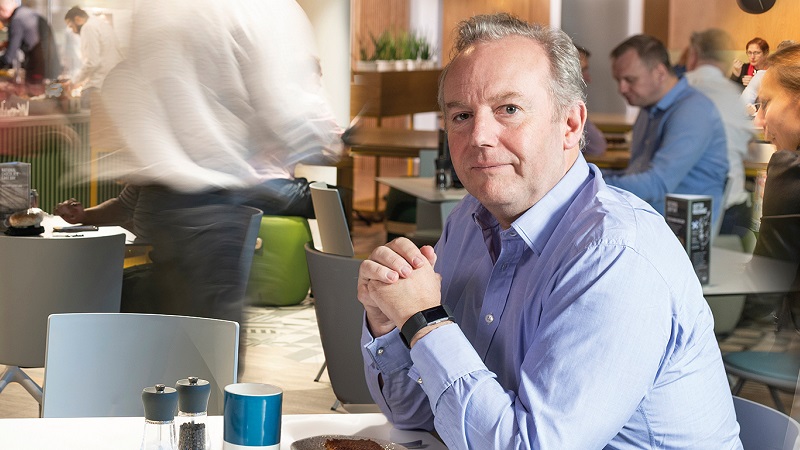Speaking to Charles Plowden in the final weeks of his near four-decade career – all spent at Baillie Gifford, the last 15 years as joint senior partner – it is only natural to ask how the UK asset management industry has changed in that time. The biggest change, replies the pioneer of the firm’s Global Alpha strategy and manager of Monks Investment Trust, is that when he first turned up for work in 1983, no such industry really existed.
“It was more of a sideshow,” Plowden elaborates. “Almost all the firms I could have joined were pretty small and there was no retail to speak of – for example, I had already been there a couple of years when Baillie Gifford went into unit trusts. Fund managers were not well-known names – many were the least well-known parts of merchant banks – and typically it was not where the most ambitious people were put to work.
“Your brightest, boldest people were put on M&A, corporate advice, debt issuance and so on – this was the era of privatisations and lots of money was being raised. So asset management’s journey to becoming a business was more of a slow creep – the best example, being Mercury, which grew out of the era’s premier investment bank, Warburgs, and has evolved through various guises to be huge and now sits at the heart of Blackrock.
“Then again, you can look at similar operations from the 1980s and see businesses that became successful wealth managers and were then dragged down by arrogant, loss-making investment bankers. So asset management has moved out of the shadows and into the foreground, and that has implications for the industry. Rather than getting investment banking’s cast-offs, for example, we now have our pick of the graduates.
“I would also hope we will continue to see a dilution of the trading influence a lot of the banks brought to investment management – the use of complex financial derivatives and so on. Remember, a lot of what did so much damage in the global financial crisis will not have started in investment management divisions but in prime brokerage or investment banking departments.”
‘Every time I thought about moving on, Baillie Gifford would offer me another opportunity’
If asset management was such a backwater in the early 1980s, then, what drew the young Plowden to Baillie Gifford?
“I wanted a foundation in company analysis and understanding markets,” he replies. “I am not from Scotland, I have no connection there – my intention was to spend two years learning in Edinburgh and then do M&A. I was not after a job at Mercury or wherever – I wanted to do the glamorous bit of merchant banking.
“But I never left. Every time I thought about moving on, Baillie Gifford would offer me another opportunity because things were beginning to develop quite quickly. It is why I really believe businesses need to grow – you need some forward momentum to provide opportunities to keep your more ambitious younger people. If you do not create opportunities for them, they will take the opportunities offered by someone else.”
Continual awareness of the next generation is a recurring theme for Plowden, whether in the context of recruitment, client acquisition, sustainable investing – an area one senses counts as ‘unfinished business’ for him, as we explore in a companion piece to this on our sister brand esgclarity.com – or Baillie Gifford’s much praised, less-often replicated, partnership structure.
On this last point, he is unequivocal, arguing: “In any people business, it is the ideal ownership structure. If your greatest asset is your people, then make them owners, give them as much skin in the game as is sensible and give them autonomy to actually lead the business. And we do. Leadership priorities are so different at different types of business but our structure allows us to say, hand on heart, that our clients are always our top priority.
“If you are managing a public company, on the other hand, your top priorities have to be your shareholders, which means you have financial forecasts and expectations to meet and a share price that tells you the score on a daily basis. People can obsess about that but it just leads to short-term, profit-maximising decisions, as opposed to health-of-the-client decisions.

Looking after the next generation
“Not having a share price and, particularly, not having outside shareholders – when I retire, my stake will pass to younger partners buying their way in, which is as it should be – means the partners can all take a 10 or 15-year view of what is in their best interests. And they all absolutely know that what is in their best interests is maximising performance and having clients who are as happy as they possibly can be.
“What is not in their interests is shooting for a short-term revenue or profit or growth target, which may have nothing to do with client satisfaction. Many investment companies have started like us but then chosen to sell up. Typically, that is one generation wanting to capitalise on the value they created whereas at Baillie Gifford – I am not sure how or why – we have always had this attitude we are holding it in trust for the next generation.
“Against all temptation, we have preserved the structure. We continue to be an unlimited liability partnership – a slightly eccentric variety that means, if Baillie Gifford got into trouble, the house I am sitting in would be on the line. That just gives us extra skin in the risk game – and in the controls. Getting all the downside as well as the upside encourages attention to detail, doing things properly, not taking chances.”
That has all been critical to the firm’s success, suggests Plowden, before acknowledging other management risks to guard against. “It is true we have tended to grow conservatively and steadily rather than very rapidly,” he says. “But does having our houses on the line mean we are too risk-averse to take big, bold decisions? I would argue the last 20 or 25 years have shown that is not the case.
“We have opened an office in Shanghai, we have made a big move into private companies, we were among the first to make big pushes into North America and Asia, our strategy range has evolved faster than many and our client base is now changing very rapidly from defined benefit (DB) pension funds into the wider savings market. So while it is a risk we could be slow or conservative in our decision-making, the evidence does not support that.”
History’s echoes
Since we are looking back as a way of looking forward – ‘History does not repeat itself but it echoes’, so to speak – I list a number of fund houses that have previously enjoyed the kind of all-rounder performance numbers Baillie Gifford has been posting over the past year or two. Does Plowden believe the firm has somehow found a way to break asset management’s inherent cyclicality?
“How many firms have ever really tried what we are doing – to remain that focused on performance?” he wonders. “One of the names you mentioned switched from being an investment house to a distribution business and all the others are, or were, public and so had different priorities. Still, I agree we are now breathing quite rarefied air and clearly some firms have reached where we are and then peaked.
“I would say, though, that Malcolm MacColl, who is succeeding me as senior partner in charge of investment, put just two sentences on the latest partners’ meeting agenda. How do we build on our cultural advantages? And how do we continue to improve as investors? For someone to take on that role at a firm with the performance we have and his number-one preoccupation is how do we get better from here? I think that is a very positive step.
“So there is no complacency but there is quite a lot of realism. We know how difficult investment is and we know how lucky we have been – particularly recently. We were in the right place at the right time, in a way that nobody could have predicted. In no way are we saying we are all geniuses – what we are saying, however, is how can we build on where we are and push on?
“And how can we carry on doing the same job we have been doing for the same clients? An interesting fact about Baillie Gifford at the moment is the number of clients we have is not increasing, on account of an accelerating turnover in our existing client base. DB pensions are giving up on active equities – probably on equities, full stop – and doing this dreadful word ‘de-risking’.
“As you can imagine, as one of their most active managers, we are in their sights here – and the fact we have done well just makes it easier for them to de-risk even further and move wholesale into bonds. A lot of people believe we have funds under management coming out of our ears but the truth is we are having to run like hell just to stand still.

Effort and motivation
“It is always the case that, when anyone does well, everyone else tries to predict when that will end. But we are just going to keep doing the same things in the same way with the same degree of effort and motivation – and I would just point out our recent performance has been better than it has ever been before. So anyone who is trying to link money under management and performance tailing off – we have so far managed to defy that theory.”
Speeding past a question on the changing influence of regulation over the past four decades – Plowden simply points to “the observable fact we probably now have as many people in our legal and compliance teams as we have investing money” – we move onto the decisions he is most proud of and most regrets. “Regrets – I have a few but then again …” is his Sinatra-like response.
“No – one of the features of the Baillie Gifford philosophy is we are optimists. We look for the upside and do not dwell on the decisions that do not work. As for the decision I am most proud of, it is not an investment one but my move 16 years ago from heading our UK equity team to set up our global equity team. It was like scales falling away from my eyes – compared with the UK, the opportunity set is just fabulous.
“So it has been great from a personal perspective and from a business perspective too because we have built a very successful franchise in core global equities – the strategy we follow on Global Alpha and Monks – that has grown from zero to about $60bn (£47bn). Most pleasing of all however, has been the result for our investors – $18.5bn of outperformance above our global benchmark and net of all fees from May 2005 to December 2020.
“It would have taken me 100 years, possibly 200, to have achieved that investing in UK equities alone – simply because the opportunity to add that much value is less. To be able to invest at scale and create that sort of value – when there are, as you know, so many people who say active management does not work – well, that is a great deal of money that suggests otherwise.”
A reckoning coming
As for the future of the sector to which he is about to bid farewell, Plowden sees “a clear-out coming”. “There are still too many people not producing the performance necessary to justify their fees,” he argues. “So two things need to happen – performance must improve and fees must come down, particularly in retail markets Institutions can usually look after themselves from a fee and cost perspective.
“That is why the active management industry still has this PR issue that most active managers do not add value – but those managers should not be allowed to get away with it. Clients should move their money. So there is still a reckoning coming although it is harder to say what that means. Consolidation seems unlikely to be the answer because I am not sure it has helped in the past.
“Let’s not mention names but we can all list big mergers where, five years on, neither party is any stronger than they were before. This is a people business – culture matters, motivations matter. It may be there are now quite a lot of ex-growth asset managers and wealth managers – but hopefully the money will then flow to those who do produce the performance and who do so at a fair fee, without being too greedy.”








